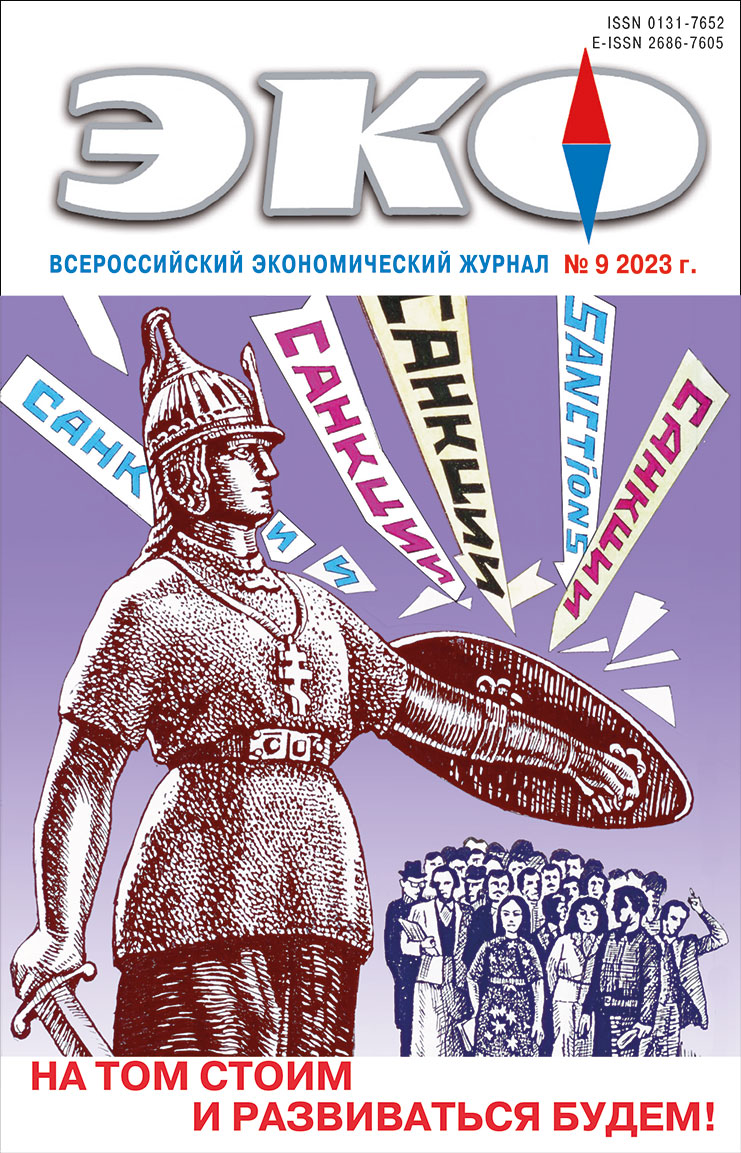Cover story: We are Here to Stay and We will Carry on Developingy!
Published 2023-08-30
Keywords
- economic sanctions; manufacturing industry; enterprises; survey of enterprise managers; import substitution
How to Cite
1.
Kuznetsov Б, Golikova В. Russian Manufacturing Executives on Sanctions Restrictions and Vulnerability to Them. ECO [Internet]. 2023 Aug. 30 [cited 2026 Feb. 24];53(9):33-51. Available from: https://ecotrends.ru/index.php/eco/article/view/4650
Abstract
The impact of sanctions on the activities and behavior of firms adapting to the imposed restrictions is heterogeneous and depends on both the type of sanctions and the characteristics of the firms themselves. The paper gives estimates of the effect of the sanctions regime by managers of manufacturing firms based on data from several rounds of monitoring of their competitiveness conducted by the Institute for Analysis of Enterprises and Markets of the National Research University Higher School of Economics in 2014, 2018 and 2022. The results of the econometric analysis showed that the negative assessment of the sanctions regime introduced in 2022 depends not only on the degree and nature of production dependence on imports, but also on the structure of sales markets. The results of the study can be useful in the development of economic policy measures with regard to import substitution and export promotion.References
- Волчкова Н.А., Турдыева Н.А. Микроэкономика российского импортозамещения // Журнал Новой экономической ассоциации. 2016. № 4 (32). С. 140–146. URL: https://www.econorus.org/repec/journl/2016–32–140–146r.pdf?ysclid=ljl18ogx2n526986710 (дата обращения: 16.03.2023).
- Зубаревич Н.В. (2001). Поляризация городов России как следствие кризиса 90-х годов // Вестник Евразии. 2001. № 1 (12). С. 5–29. URL: https://cyberleninka.ru/article/n/polyarizatsiya-gorodov-rossii-kak-sledstvie-krizisa-90-h-godov/viewer (дата обращения: 16.03.2023).
- Найдёнова Ю.Н., Шалаева Е.В. Неопределенность экономической политики в условиях санкционных ограничений: влияние на запас денежных средств российских компаний // Российский журнал менеджмента. 2022. № 20 (4). С. 482–497 [Эл. ресурс]. https://dspace.spbu.ru/bitstream/11701/41645/1/02.pdf?ysclid=ljl1a3jgtn30288505 (дата обращения: 16.03.2023).
- Федюнина А.А., & Аверьянова Ю.В. Эмпирический анализ факторов конкурентоспособности российских экспортеров // Экономическая политика. 2018. 13 (6). С. 102–121 [Эл. ресурс]. Available at: https://cyberleninka.ru/article/n/empiricheskiy-analiz-faktorov-konkurentosposobnosti-rossiyskih-eksporterov/viewer (дата обращения: 16.03.2023).
- Ahn, D. & Ludema, R. (2020). The sword and the shield: The economics of targeted sanctions. European Economic Review. Vol. 130(C) Available at: https://www.econstor.eu/bitstream/10419/198980/1/cesifo1_wp7620.pdf (accessed 16.03.2023).
- Bas, M., Strauss-Kahn, V. (2014). Does importing more inputs raise exports? Firm-level evidence from France. Revue of World Economics. Vol. 150. Рp. 241–275. Available at: https://www.researchgate.net/publication/48375886_Does_Importing_more_Inputs_Raise_Exports_Firm_Level_Evidence_from_France (accessed 16.03.2023).
- Castellani, D. and Fassio, C. (2019). From new imported inputs to new exported products. Firm-level evidence from Sweden. Research Policy. Vol. 48. Issue 1. Рp. 322–338. Available at: https://www.researchgate.net/publication/327598978_From_new_imported_inputs_to_new_exported_products_Firm-level_evidence_from_Sweden (accessed 16.03.2023).
- Huynh, T.L.D., Hoang, K. and Ongena, S. (2022). The impact of foreign sanctions on firm performance in Russia. CEPR Discussion Paper 17415. Available at: https://www.researchgate.net/publication/363172240_The_impact_of_foreign_sanctions_on_firm_performance_in_Russia (accessed 16.03.2023).
- Gaur, A.S., Settles, A., & Vaatanen, J. (2023). Do Economic Sanctions Work? Evidence from Russia-Ukraine conflict. Journal of Management Studies, doi:10.1111/joms.12933. Available at: https://papers.ssrn.com/sol3/papers.cfm?abstract_id=4433798 (accessed 16.03.2023).
- Golikova, V. and Kuznetsov, B. (2017). Perception of risks associated with economic sanctions. Post-Soviet Affairs. Vol. 33, Issue 1. Рp. 49–62. Available at: https://economics.hse.ru/data/2017/05/19/1172226903/Perception%20of%20risks%20associated%20with%20econ..e%20case%20of%20Russian%20manufacturing.pdf?ysclid=ljl1joskyu243166301 (accessed 16.03.2023).
- Keerati, Ritt (2022). The unintended consequences of financial sanctions. Available at SSRN: https://ssrn.com/abstract=4049281 or http://dx.doi.org/10.2139/ssrn.4049281 (accessed 16.03.2023).
- Ling, F., Li, Z., Swenson, D. (2016). The connection between imported intermediate inputs and exports: Evidence from Chinese firms. Journal of International Economics. Vol. 101. Рp. 86–101. Available at: https://www.econstor.eu/bitstream/10419/75421/1/749387009.pdf (accessed 16.03.2023).
- Melitz, M. (2003). The Impact of Trade on Intra-Industry Reallocations and aggregate industry productivity. Econometrica. Vol. 71, No. 6. Pp. 1695–1725 Available at: https://web.stanford.edu/~klenow/Melitz.pdf (accessed 16.03.2023)
- Meyer, K., Fang, T., Panibratov, A., Peng, M. Gaur, A. (2023). International business under sanctions. Journal of World Business, No. 58 (2). Available at: https://www.researchgate.net/publication/367414682_International_business_under_sanctions (accessed 16.03.2023).
- Nigmatulina, D. (2022). Sanctions and misallocation. How sanctioned firms won and Russia lost. CEPR (Centre for Economic Performance) Discussion Paper N1886. November, 66 p. Available at: https://papers.ssrn.com/sol3/papers.cfm?abstract_id=3825246 (accessed 16.03.2023).
- Simola, H. (2023). What the literature says about the effects of sanctions on Russia? BOFIT Policy Brief. No. 8. 18 p. Available at: https://publications.bof.fi/bitstream/handle/10024/52716/bpb0823.pdf?sequence=1&isAllowed=y (accessed 16.03.2023).

